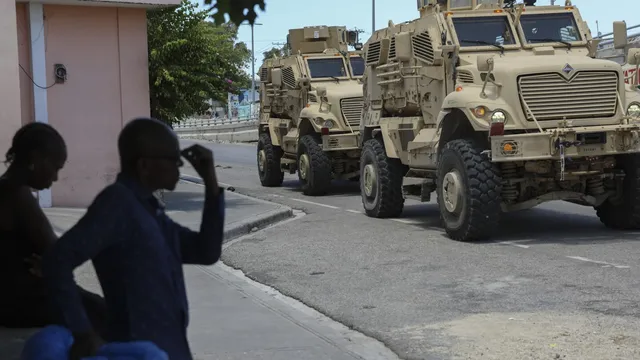
Kenya"s president visits Haiti amid UN peacekeeping challenges
2024-09-21 19:18- Kenyan President William Ruto arrived in Haiti to support a U.N. peacekeeping mission amid escalating gang violence.
- The current forces, primarily from Kenya and Jamaica, are deemed insufficient to combat gangs controlling 80% of Port-au-Prince.
- The establishment of a provisional electoral council aims to facilitate elections, which many hope will restore order in Haiti.
Express your sentiment!
Insights
Kenyan President William Ruto's visit to Haiti marks a significant moment as the United Nations seeks to address the challenges faced by the peacekeeping mission involving Kenyan and Jamaican forces. These forces are currently struggling to manage the rampant gang violence that has plagued the nation, particularly in the capital, Port-au-Prince, where gangs control approximately 80% of the area. The situation has escalated since the assassination of President Jovenel Moïse in 2021, leading to increased instability and a power vacuum that gangs have exploited. Approximately 400 Kenyan police are already deployed in Haiti, with a small contingent of Jamaican police and soldiers arriving recently. However, the United States and other nations have expressed concerns that the current troop levels are insufficient and lack the necessary resources to effectively combat the gangs. The mission is expected to expand to a total of 2,500 personnel, with additional contributions from countries like the Bahamas, Bangladesh, Barbados, Benin, and Chad, although timelines for their deployment remain uncertain. The U.N. has faced criticism regarding its previous peacekeeping efforts in Haiti, particularly due to incidents of cholera outbreaks and allegations of sexual abuse. This history complicates discussions about the potential for a new U.N. peacekeeping force. Amidst this backdrop, a U.N. human rights expert has highlighted the worsening gang violence and the inadequacies of Haiti's National Police in addressing the crisis. Ruto's visit coincides with Haiti's establishment of a provisional electoral council, a move that the international community has long advocated for. This council aims to facilitate the first general elections since 2016, with hopes that restoring democratic processes will help stabilize the country alongside the ongoing peacekeeping efforts.
Contexts
Kenya's president visited Haiti amid escalating gang violence and challenges faced by the UN peacekeeping mission. A recent UN report highlighted that from April to June, over 1,300 people were killed and 700,000 were left homeless due to the surge in violence. The National Police, with only 5,000 officers, are struggling to maintain order, exacerbated by a lack of resources and funding for the UN-backed mission. In response to the ongoing crisis, Haiti's government has established a provisional electoral council to prepare for the first general elections since 2016. This move comes after a prolonged political instability marked by the assassination of former President Jovenel Moïse and the dissolution of the previous electoral council in 2021. The establishment of the electoral council is a crucial step towards restoring governance and stability in the country. The international community has been urged to provide increased support to address the humanitarian crisis in Haiti, as the situation continues to deteriorate. The visit by Kenya's president may be part of broader efforts to engage with international partners to find solutions to the challenges facing Haiti and to enhance the effectiveness of the UN mission. Overall, the combination of gang violence, political instability, and inadequate resources poses significant challenges for peacekeeping efforts in Haiti, necessitating urgent international attention and action.